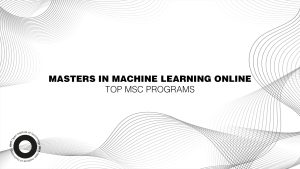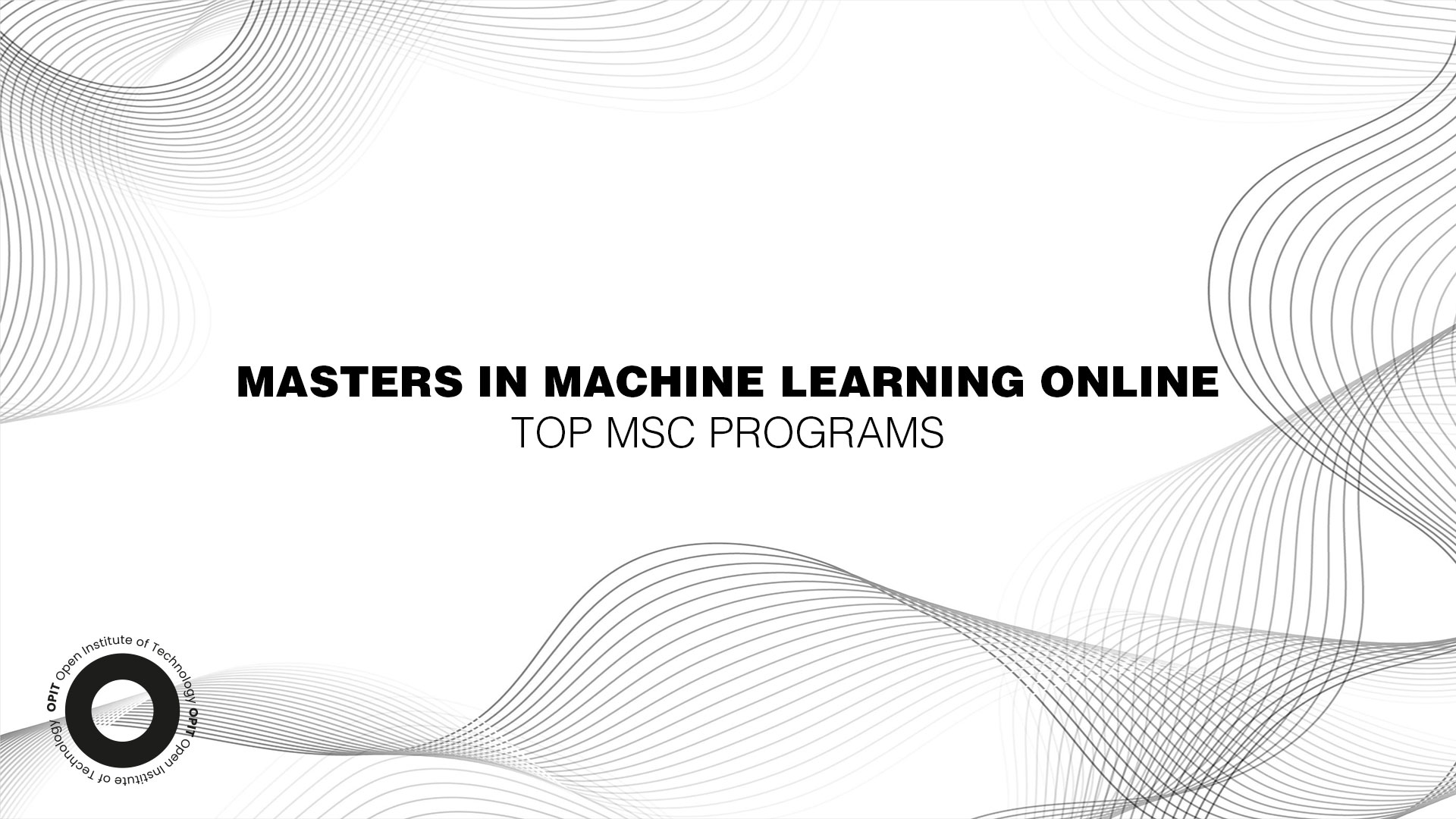Read the full article below (in Italian):


Machines that can learn on their own have been a sci-fi dream for decades. Lately, that dream seems to be coming true thanks to advances in AI, machine learning, deep learning, and other cutting-edge technologies.
Have you used Google’s search engine recently or admired the capabilities of ChatGPT? That means you’ve seen machine learning in action. Besides those renowned apps, the technology is widespread across many industries, so much so that machine learning experts are in increasingly high demand worldwide.
Chances are there’s never been a better time to get involved in the IT industry than today. This is especially true if you enter the market as a machine learning specialist. Fortunately, getting proficient in this field no longer requires enlisting in a college – now you can finish a Master in machine learning online.
Let’s look at the best online Masters in machine learning and data science that you can start from the comfort of your home.
Top MSc Programs in Machine Learning Online
Finding the best MSc machine learning online programs required us to apply certain strict criteria in the search process. The following is a list of programs that passed our research with flying colors. But first, here’s what we looked for in machine learning MSc courses.
Our Criteria
The criteria we applied include:
- The quality and reputation of the institution providing the course
- International degree recognition
- Program structure and curriculum
- Duration
- Pricing
Luckily, numerous world-class universities and organizations have a machine learning MSc online. Their degrees are accepted around the world, and their curricula count among the finest in the market. Take a look at our selection.
Imperial College London – Machine Learning and Data Science
The Machine Learning and Data Science postgraduate program from the Imperial College in London provides comprehensive courses on models applicable to real-life scenarios. The program features hands-on projects and lessons in deep learning, data processing, analytics, and machine learning ethics.
The complete program is online-based and relies mostly on independent study. The curriculum consists of 13 modules. With a part-time commitment, this program will last for two years. The fee is the same for domestic and overseas students: £16,200
European School of Data Science & Technology – MSc Artificial Intelligence and Machine Learning
If you need a Master’s program that combines the best of AI and machine learning, the European School of Data Science & Technology has an excellent offer. The MSc Artificial Intelligence and Machine Learning program provides a sound foundation of the essential concepts in both disciplines.
During the courses, you’ll examine the details of reinforcement learning, search algorithms, optimization, clustering, and more. You’ll also get the opportunity to work with machine learning in the R language environment.
The program lasts for 18 months and is entirely online. Applicants must cover a registration fee of €1500 plus monthly fees of €490.
European University Cyprus – Artificial Intelligence Master
The European University in Cyprus is an award-winning institution that excels in student services and engagement, as well as online learning. The Artificial Intelligence Master program from this university treats artificial intelligence in a broader sense. However, machine learning is a considerable part of the curriculum, being taught alongside NLP, robotics, and big data.
The official site of the European University Cyprus states the price for all computer science Master’s degrees at €8,460. However, it’s worth noting that there’s a program for financial support and scholarships. The duration of the program is 18 months, after which you’ll get an MSc in artificial intelligence.
Udacity – Computer Vision Nanodegree
Udacity has profiled itself as a leading learning platform. Its Nanodegree programs provide detailed knowledge on numerous subjects, such as this Computer Vision Nanodegree. The course isn’t a genuine MSc program, but it offers specialization for a specific field of machine learning that may serve for career advancement.
This program includes lessons on the essentials of image processing and computer vision, deep learning, object tracking, and advanced computer vision applications. As with other Udacity courses, learners will enjoy support in real-time as well as career-specific services for professional development after finishing the course.
This Nanodegree has a flexible schedule, allowing you to set a personalized learning pace. The course lasts for three months and has a fee of €944. Scholarship options are also available for this program, and there are no limitations in terms of applying for the course or starting the program.
Lebanese American University – MS in Applied Artificial Intelligence
Lebanese American University curates the MS in Applied Artificial Intelligence study program, led by experienced faculty members. The course is completely online and focuses on practical applications of AI programming, machine learning, data learning, and data science. During the program, learners will have the opportunity to try out AI solutions for real-life issues.
This MS program has a duration of two years. During that time, you can take eight core courses and 10 elective courses, including subjects like Healthcare Analytics, Big Data Analytics, and AI for Biomedical Informatics.
The price of this program is €6,961 per year. It’s worth noting that there’s a set application deadline and starting date for the course. The first upcoming application date is in July, with the program starting in September.
Data Science Degrees: A Complementary Path
Machine learning can be viewed as a subcategory of data science. While the former focuses on methods of supervised and unsupervised AI learning, the latter is a broad field of research. Data science deals with everything from programming languages to AI development and robotics.
Naturally, there’s a considerable correlation between machine learning and data science. In fact, getting familiar with the principles of data science can be quite helpful when studying machine learning. That’s why we compiled a list of degree programs for data science that will complement your machine learning education perfectly.
Top Online Data Science Degree Programs
Purdue Global – Online Bachelor of Science Degree in Analytics
Data analytics represents one of the essential facets of data science. The Online Bachelor of Science Degree in Analytics program is an excellent choice to get familiar with data science skills. To that end, the program may complement your machine learning knowledge or serve as a starting point for a more focused pursuit of data science.
The curriculum includes nine different paths of professional specialization. Some of those concentrations include cloud computing, network administration, game development, and software development in various programming languages.
Studying full-time, you should be able to complete the program within four years. Each course has a limited term of 10 weeks. The program in total requires 180 credits, and the price of one credit is $371 or its equivalent in euros.
Berlin School of Business and Innovation – MSc Data Analytics
MSc Data Analytics is a postgraduate program from the Berlin School of Business and Innovation (BSBI). As an MSc curriculum, the program is relatively complex and demanding, but will be more than worthwhile for anyone wanting to gain a firm grasp of data analytics.
This is a traditional on-campus course that also has an online variant. The program focuses on data analysis and extraction and predictive modeling. While it could serve as a complementary degree to machine learning, it’s worth noting that this course may be the most useful for those pursuing a multidisciplinary approach.
This MSc course lasts for 18 months. Pricing differs between EU and non-EU students, with the former paying €8,000 and the latter €12,600.
Imperial College London – Machine Learning and Data Science
It’s apparent from the very name that this Imperial College London program represents an ideal mix. Machine Learning and Data Science combines the two disciplines, providing a thorough insight into their fundamentals and applications.
The two-year program is tailored for part-time learners. It consists of core modules like Programming for Data Science, Ethics in Data Science and Artificial Intelligence, Deep Learning, and Applicable Mathematics.
This British-based program costs £16,200 yearly, both for domestic and overseas students. Some of the methods include lectures, tutorials, exercises, and reading materials.
Thriving Career Opportunities With a Masters in Machine Learning Online
Jobs in machine learning require proper education. The chances of becoming a professional in the field without mastering the subject are small – the industry needs experts.
A Master’s degree in machine learning can open exciting and lucrative career paths. Some of the best careers in the field include:
- Data scientist
- Machine learning engineer
- Business intelligence developer
- NLP scientist
- Software engineer
- Machine learning designer
- Computational linguist
- Software developer
These professions pay quite well across the EU market. The median annual salary for a machine learning specialist is about €70,000 in Germany, €68,000 in the Netherlands, €46,000 in France, and €36,000 in Italy.
On the higher end, salaries in these countries can reach €98,000, €113,000, €72,000, and €65,000, respectively. To reach these more exclusive salaries, you’ll need to have a quality education in the field and a level of experience.
Become Proficient in Machine Learning Skills
Getting a Master’s degree in machine learning online is convenient, easily accessible, and represents a significant career milestone. With the pace at which the industry is growing today, it would be a wise choice.
Since the best programs offer a thorough education, great references, and a chance for networking, there’s no reason not to check out the courses on offer. Ideally, getting the degree could mark the start of a successful career in machine learning.
Related posts

Source:
- Agenda Digitale, published on June 16th, 2025
By Lokesh Vij, Professor of Cloud Computing Infrastructure, Cloud Development, Cloud Computing Automation and Ops and Cloud Data Stacks at OPIT – Open Institute of Technology
NIST identifies five key characteristics of cloud computing: on-demand self-service, network access, resource pooling, elasticity, and metered service. These pillars explain the success of the global cloud market of 912 billion in 2025
Read the full article below (in Italian):

You’ve probably seen two of the most recent popular social media trends. The first is creating and posting your personalized action figure version of yourself, complete with personalized accessories, from a yoga mat to your favorite musical instrument. There is also the Studio Ghibli trend, which creates an image of you in the style of a character from one of the animation studio’s popular films.
Both of these are possible thanks to OpenAI’s GPT-4o-powered image generator. But what are you risking when you upload a picture to generate this kind of content? More than you might imagine, according to Tom Vazdar, chair of cybersecurity at the Open Institute of Technology (OPIT), in a recent interview with Wired. Let’s take a closer look at the risks and how this issue ties into the issue of responsible artificial intelligence.
Uploading Your Image
To get a personalized image of yourself back from ChatGPT, you need to upload an actual photo, or potentially multiple images, and tell ChatGPT what you want. But in addition to using your image to generate content for you, OpenAI could also be using your willingly submitted image to help train its AI model. Vazdar, who is also CEO and AI & Cybersecurity Strategist at Riskoria and a board member for the Croatian AI Association, says that this kind of content is “a gold mine for training generative models,” but you have limited power over how that image is integrated into their training strategy.
Plus, you are uploading much more than just an image of yourself. Vazdar reminds us that we are handing over “an entire bundle of metadata.” This includes the EXIF data attached to the image, such as exactly when and where the photo was taken. And your photo may have more content in it than you imagine, with the background – including people, landmarks, and objects – also able to be tied to that time and place.
In addition to this, OpenAI also collects data about the device that you are using to engage with the platform, and, according to Vazdar, “There’s also behavioral data, such as what you typed, what kind of image you asked for, how you interacted with the interface and the frequency of those actions.”
After all that, OpenAI knows a lot about you, and soon, so could their AI model, because it is studying you.
How OpenAI Uses Your Data
OpenAI claims that they did not orchestrate these social media trends simply to get training data for their AI, and that’s almost certainly true. But they also aren’t denying that access to that freely uploaded data is a bonus. As Vazdar points out, “This trend, whether by design or a convenient opportunity, is providing the company with massive volumes of fresh, high-quality facial data from diverse age groups, ethnicities, and geographies.”
OpenAI isn’t the only company using your data to train its AI. Meta recently updated its privacy policy to allow the company to use your personal information on Meta-related services, such as Facebook, Instagram, and WhatsApp, to train its AI. While it is possible to opt-out, Meta isn’t advertising that fact or making it easy, which means that most users are sharing their data by default.
You can also control what happens with your data when using ChatGPT. Again, while not well publicized, you can use ChatGPT’s self-service tools to access, export, and delete your personal information, and opt out of having your content used to improve OpenAI’s model. Nevertheless, even if you choose these options, it is still worth it to strip data like location and time from images before uploading them and to consider the privacy of any images, including people and objects in the background, before sharing.
Are Data Protection Laws Keeping Up?
OpenAI and Meta need to provide these kinds of opt-outs due to data protection laws, such as GDPR in the EU and the UK. GDPR gives you the right to access or delete your data, and the use of biometric data requires your explicit consent. However, your photo only becomes biometric data when it is processed using a specific technical measure that allows for the unique identification of an individual.
But just because ChatGPT is not using this technology, doesn’t mean that ChatGPT can’t learn a lot about you from your images.
AI and Ethics Concerns
But you might wonder, “Isn’t it a good thing that AI is being trained using a diverse range of photos?” After all, there have been widespread reports in the past of AI struggling to recognize black faces because they have been trained mostly on white faces. Similarly, there have been reports of bias within AI due to the information it receives. Doesn’t sharing from a wide range of users help combat that? Yes, but there is so much more that could be done with that data without your knowledge or consent.
One of the biggest risks is that the data can be manipulated for marketing purposes, not just to get you to buy products, but also potentially to manipulate behavior. Take, for instance, the Cambridge Analytica scandal, which saw AI used to manipulate voters and the proliferation of deepfakes sharing false news.
Vazdar believes that AI should be used to promote human freedom and autonomy, not threaten it. It should be something that benefits humanity in the broadest possible sense, and not just those with the power to develop and profit from AI.
Responsible Artificial Intelligence
OPIT’s Master’s in Responsible AI combines technical expertise with a focus on the ethical implications of AI, diving into questions such as this one. Focusing on real-world applications, the course considers sustainable AI, environmental impact, ethical considerations, and social responsibility.
Completed over three or four 13-week terms, it starts with a foundation in technical artificial intelligence and then moves on to advanced AI applications. Students finish with a Capstone project, which sees them apply what they have learned to real-world problems.
Have questions?
Visit our FAQ page or get in touch with us!
Write us at +39 335 576 0263
Get in touch at hello@opit.com
Talk to one of our Study Advisors
We are international
We can speak in:


